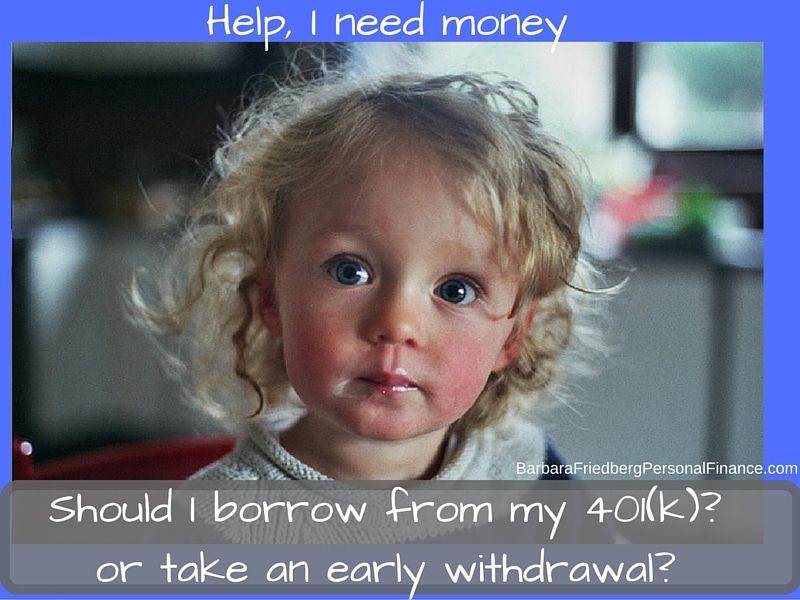Should I Cash Out my 401K or Borrow From my 401K?
*Disclosure: Please note that this article contains affiliate links which means that – at zero cost to you – I might earn a commission if you sign up through the affiliate link.
If you need a large amount of money, you might be tempted to dip into your retirement fund. After all, borrow from your 401k and you’re taking your own money.
Sounds simple enough but are there consequences to borrowing from a 401k vs hardship withdrawal.
You’ll learn how to borrow from a 401k and the advantages and disadvantages of this decision.
You’ll find out the ins and outs of a 401k early withdrawal and 401k hardship withdrawal and whether that decision is right for you.
When considering whether to take a 401k loan vs a 401k hardship withdrawal, look at the decision from all sides and then make your decision.
Just because you can borrow from your 401k or take a 401k hardship withdrawal, doesn’t mean that you should.
Don’t miss the Bonus Section that describes the 2020 CARES Act changes in the 401k loan and 401k early withdrawal rules.
Contents
Should I Take out a 401k Loan?
When times are tough and you need extra cash, it may be tempting to borrow from your 401k. And, we’re not saying that you shouldn’t take out a 401k loan, but understand the 401k loan rules as well as the advantages and disadvantages of a 401k loan.
Get a free 401k retirement account check up with Blooom. It’s very quick and could save you fees and improve your returns.
Some people like the idea of a 401k loan because you’re essentially borrowing from yourself and paying yourself back. Because of this arrangement, you don’t have to go through a credit check, so the loan process moves along quickly. According to Nick Thornton’s “Why 401k Loans aren’t Always a Bad Thing” at BenefitsPro.com, almost 90 percent of 401(k) plans offer loan options. Still, proceed cautiously before taking the plunge.
What is a 401k Loan?
A 401k loan is simply a loan from the balance in your workplace 401k retirement account.
Your 401k loan rules are determined by your plan and lay out whether you’re able to take out a 401k loan or borrow from your 401k. Your employer isn’t required to offer a 401k loan, although most do.
Some companies limit the reasons for a 401k loan withdrawal. Check with the human resources department to find out whether your company allows 401k loans or not.
Also, some 401k loans require a spousal signature.
When you borrow from your 401k, you sign an agreement that lays out:
- The amount borrowed
- The length or term of the loan
- The interest rate
- Other fees or terms
Most 401k loans are approved, since you’re borrowing your own money!
How Much Can You Borrow From Your 401k?
Your maximum loan size depends upon whether you’re vested in your retirement plan and the guidelines of your company. If you’re vested, your retirement account still belongs to you, even after you leave a company.
Your personal contributions are always fully vested with a 401(k). Depending upon your plan, you may or may not have access to your employer contributions.
The IRS limits how much you can borrow from your 401k to the lesser of $50,000 or half of the amount vested in the plan. The interest rate must be competitive with current market interest rates.
Although, if you still have a 401k plan at a former employer, you can’t borrow from the 401k.
What are the Tax Consequences of a 401k Loan and the Repayment Schedule?
In general, your cash withdrawal from a 401k loan is not taxed, unless you fail to repay it. Then you will be subject to ordinary income tax and if you’re younger than age 59 ½, you’ll pay a 10 percent penalty as well.
Under most circumstances you must repay a 401k loan within five years.
The 401k loan repayment and interest payments all go back into your own 401k account.
Bonus: Blooom 401k Review – Investment Management Help for Your 401k
When is it Okay to Take out a 401k Loan?
Although it’s usually best to leave your money invested and growing for the future in your 401k retirement account, in some cases it’s reasonable to take out a 401k loan.
Wondering if you should borrow from your 401k for a house? The answer is maybe.
The debt borrowed to buy a home is generally considered “good debt” because a home is typically a wise investment. Since a 401k loan is a relatively short-term loan, normally five years or less, you might borrow money for the closing costs or to help with the down payment, as long as you will be able to pay it back within the five years.
If you’re 401k is large enough and you’re set up for retirement, then you might consider borrowing to help pay for a child’s college tuition or for another short- to intermediate-term need. Compare the interest rate for your 401k loan with a loan you might get from a bank or other lender.
Find out if you can increase 401k returns with a free retirement check up at Blooom. (ADD LINK)
When is Borrowing From Your 401k a Bad Idea?
If you don’t think you can make the 401k loan payments, it’s a bad idea to borrow.
If you can’t make a payment within the pre-specified time then the IRS considers the loan to be taxable income. You’ll have to pay tax on the 401k loan and if you’re less than 59 ½ years old, you also have to pay a 10 percent early withdrawal penalty. Ouch, this is a huge penalty, and should be avoided if at all possible.
If you think you’ll be leaving your job soon, it’s unwise to borrow from your 401k. If you don’t repay your loan after leaving the job within a specified time, then the loan will be treated as a withdrawal and you’ll owe a 10% penalty and income taxes.
If you’re using your money to pay for a consumable event such as a vacation or wedding, understand the consequences of taking out a 401k loan. Some employers will disallow new 401k contributions if there’s an outstanding loan, thus compromising your future retirement nest egg.
In general, we don’t recommend borrowing for any consumable event like a vacation, wedding, or holiday gift shopping.
When the money is removed from the account, it’s not growing for your future.
Should I Take a 401k Early Withdrawal?
Taking an early withdrawal means you have no intention of paying the money back. Since the 401k is supposed to be your retirement account, both the IRS and employers’ frown upon this. Therefore, the conditions are quite strict.
What are the Tax Consequences of a 401k Early Withdrawal?
If you withdraw money from your 401k before age 59½ then you’re subject to a 10% penalty and income tax on the withdrawal. For example, withdraw $15,000 from your 401k and you’ll owe a $1,500 penalty plus $3,300 (22% tax on $15,000) or $4,800.
That’s almost one third of your 401k withdrawal lost to taxes and penalties and not available for retirement spending.
However, certain employees with Roth 401k plans are more fortunate. If you’re at least 59 ½ and it’s been at least five years since the start of the year you began contributing, your withdrawal may not be taxed or penalized. Speak with a tax professional for more information.
If you’re old enough to retire but are still working, the IRS doesn’t limit early withdrawals. However, your individual 401k plan might have its own restrictions. You’ll need to check your employer’s rules.
What is a 401k Hardship Withdrawal?
The 401k hardship withdrawal rules allow for ways to take out your 401k funds without severe penalties.
The finra.org website explains the 401k hardship withdrawal guidelines. Although, 401k hardship withdrawal guidelines are ultimately decided by your employer.
Example of potential hardship withdrawal circumstances:
- Out-of-pocket medical expenses
- Down payment or repairs on a primary residence
- College tuition and related education expenses
- Payments to prevent mortgage foreclosure or eviction
- Burial and funeral expenses
Remember that a 401k withdrawal is permanent and will reduce
the amount of money you’ll have to fund your retirement.
What are 401k Hardship Withdrawal Rules and Examples?
Employers take 401k hardship withdrawals seriously and may have specific rules that impact pulling out your contributions. Check with your human resources department for information about taking money out of your 401k.
Rules for 401k hardship withdrawals include:
- Taxes will be due on withdrawals.
- A 10% penalty will likely be due if you are younger than age 59 ½, unless you qualify for other exceptions.
- Companies may prohibit additional 401k contributions for at least six months after taking the withdrawal.
Special 2020 401k Loan and 401k Hardship Withdrawal Provisions
The CARES Act, created to help citizens with the financial impact of the Corona Virus or COVID-19, has loosened the 401k loan and 401k early withdrawal restrictions.
Companies are allowed, although not required to enact the following adjustments to their 401k loan and 401k hardship withdrawal plans.
Individuals can borrow up to $100,000 for six months in 2020, for six months after the CARES Act begins, double the typical $50,000 amount. Qualified individuals can borrow up to the lesser of $10,000 or 100% of their account balance, rather than the currently allowed 50% of the account balance.
The due date for repayment of an existing loan that comes due in 2020 after the enactment of the CARES Act has an additional year to repay the loan.
There is no 10% penalty for a distribution of up to $100,000 from a 401k plan made in 2020 due to the financial impact of the Corona Virus.
The income tax due for the early 401k hardship withdrawal can be paid over 3 years.
Distributions that are withdrawn and will be rolled over into another plan have three years instead of three months to invest the funds in another retirement account before income taxes and an early withdrawal penalty is due.
These rules are subject to change.
401k Loan vs Withdrawal Wrap up
Many 401k plans let you borrow money or take an early withdrawal. Both have their pluses and minuses. However, they have one thing in common: If you take out money, you’ll typically have saved less when it’s time for retirement.
Whether you borrow from your 401k or take an early withdrawal from your 401k, you’re going to take a financial hit at retirement. Only you can decide if using the money now is worth the sacrifices you’ll face in the future. For most people, retirement funds are best left untouched until you’re ready to leave the workplace behind permanently.
Whether you decide to take a 401k hardship loan, 401k early withdrawal or not, use Blooom for a quick 401k check to find out if you’ve selected the best funds from your plan.
Featured image by Jens Lelie on Unsplash
*Disclosure: Please note that this article may contain affiliate links which means that – at zero cost to you – I might earn a commission if you sign up or buy through the affiliate link. That said, I never recommend anything I don’t believe is valuable.



